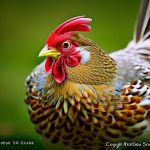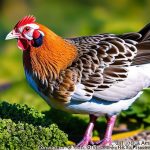Maintaining dry conditions for chickens during winter is essential for their health and productivity. Prolonged exposure to moisture can lead to various health issues, including respiratory problems, frostbite, and a weakened immune system. Wet feathers reduce insulation, making it difficult for chickens to regulate their body temperature and potentially causing hypothermia.
These factors can ultimately result in decreased egg production or even death. Damp environments force chickens to expend more energy to stay warm, leaving less energy available for egg production. By keeping chickens dry and comfortable, poultry keepers can help maintain consistent egg-laying throughout the winter months.
Additionally, dry conditions reduce the risk of stress-related illnesses and promote overall well-being. To ensure optimal health and productivity, it is crucial to implement proper housing and management practices that protect chickens from moisture during the winter season. This includes providing adequate ventilation, using appropriate bedding materials, and regularly maintaining the coop to prevent water accumulation.
Table of Contents
- 1 Providing Adequate Shelter for Chickens
- 2 Ensuring Proper Ventilation in the Coop
- 3 Using Bedding and Litter to Absorb Moisture
- 4 Protecting Chickens from Rain and Snow
- 5 Providing Dry and Warm Feeding and Watering Areas
- 6 Monitoring and Maintaining the Coop Regularly
- 7 FAQs
- 7.1 What are the main challenges of keeping chickens dry in winter?
- 7.2 How can I keep my chicken coop dry in winter?
- 7.3 What bedding should I use to keep my chickens dry in winter?
- 7.4 How can I protect my chickens from rain and snow in winter?
- 7.5 What should I feed my chickens to help them stay dry in winter?
Key Takeaways
- Keeping chickens dry in winter is crucial for their health and well-being
- Adequate shelter is essential to protect chickens from harsh weather conditions
- Proper ventilation in the coop is necessary to prevent moisture buildup
- Using bedding and litter helps absorb moisture and keep the coop dry
- Protecting chickens from rain and snow is important to prevent them from getting wet and cold
Providing Adequate Shelter for Chickens
Designing a Well-Constructed Coop
A well-constructed coop is essential for protecting chickens from the elements and ensuring they stay dry and warm. The coop should be designed to provide protection from rain, snow, and wind while also allowing for proper ventilation. It should be raised off the ground to prevent flooding and provide a dry environment for the chickens. Additionally, the coop should have a sloped roof to allow rain and snow to run off easily, preventing water from pooling on top of the structure.
Insulation and Ventilation
Providing adequate shelter for chickens also means ensuring that the coop is well-insulated. Insulation can help maintain a comfortable temperature inside the coop and prevent moisture from building up. This can be achieved by using materials such as straw, hay, or wood shavings to line the coop and provide additional insulation. Additionally, sealing any gaps or cracks in the coop can help prevent drafts and keep the interior dry and warm.
Key Considerations
Overall, providing adequate shelter for chickens is essential for keeping them dry and comfortable during the winter months. By designing a well-constructed coop, ensuring proper insulation and ventilation, and paying attention to key details such as raising the coop off the ground and using a sloped roof, chicken owners can help keep their flock happy and healthy throughout the winter.
Ensuring Proper Ventilation in the Coop

Proper ventilation is crucial for keeping chickens dry in winter. While it may seem counterintuitive to have ventilation in a coop during cold weather, it is essential for maintaining a healthy environment for the chickens. Adequate ventilation helps remove excess moisture from the coop, preventing condensation and dampness.
This can help reduce the risk of respiratory issues and frostbite in chickens. Additionally, proper ventilation can help regulate the temperature inside the coop, preventing it from becoming too hot or too cold. To ensure proper ventilation in the coop, it is important to have vents or windows that can be opened and closed as needed.
This allows for airflow control depending on the weather conditions. Additionally, placing vents near the roof of the coop can help remove warm, moist air that rises to the top of the structure. This can help prevent condensation from forming on the walls and ceiling of the coop.
Overall, ensuring proper ventilation in the coop is essential for keeping chickens dry and healthy during the winter months.
Using Bedding and Litter to Absorb Moisture
Using bedding and litter in the coop is essential for absorbing moisture and keeping chickens dry in winter. Bedding materials such as straw, hay, or wood shavings provide a comfortable and insulating layer for chickens to rest on. Additionally, these materials can absorb moisture from droppings and spills, helping to keep the coop dry and odor-free.
Regularly adding fresh bedding can help maintain a clean and dry environment for the chickens. Furthermore, using litter on the floor of the coop can also help absorb moisture and prevent dampness. Litter materials such as sand or pine shavings provide a dry surface for chickens to walk on and help absorb any excess moisture in the coop.
Additionally, using deep litter methods, where new bedding is added on top of old bedding, can help create a natural composting process that generates heat and helps keep the coop warm. Overall, using bedding and litter to absorb moisture is essential for maintaining a dry and comfortable environment for chickens during the winter months.
Protecting Chickens from Rain and Snow
Protecting chickens from rain and snow is essential for keeping them dry in winter. Exposure to wet weather conditions can lead to cold stress, hypothermia, and other health issues in chickens. To protect chickens from rain and snow, it is important to ensure that their outdoor run or free-range area is covered with a waterproof roof or tarp.
This can provide a dry space for chickens to roam and exercise while protecting them from the elements. Additionally, providing shelters or covered areas within the chicken’s outdoor space can offer protection from rain and snow. This can include structures such as small sheds or covered platforms where chickens can seek refuge during inclement weather.
Providing ample protection from rain and snow can help keep chickens dry and comfortable throughout the winter months. Overall, protecting chickens from rain and snow is essential for maintaining their health and well-being during cold weather.
Providing Dry and Warm Feeding and Watering Areas

Protecting Feeding Areas from the Elements
In addition to providing a warm and dry shelter, it is crucial to ensure that feeding areas are also protected from rain and snow during the winter months. Wet feed can spoil quickly and become moldy, leading to potential health issues for chickens. Therefore, it is essential to provide feeding areas that are shielded from the elements.
Keeping Watering Areas Ice-Free and Accessible
Ensuring that watering areas are kept free from ice and snow is vital for maintaining hydration in chickens. Using heated waterers or regularly checking and replacing frozen water can help ensure that chickens have access to clean and unfrozen water at all times. Additionally, placing waterers in sheltered areas can help prevent them from freezing over quickly.
Overall Importance of Dry and Warm Feeding and Watering Areas
Providing dry and warm feeding and watering areas is essential for keeping chickens healthy and comfortable during the winter months. By taking these precautions, you can help ensure that your chickens remain happy and healthy throughout the cold winter season.
Monitoring and Maintaining the Coop Regularly
Finally, monitoring and maintaining the coop regularly is essential for keeping chickens dry in winter. Regular inspections of the coop can help identify any potential issues such as leaks, drafts, or dampness. Addressing these issues promptly can help prevent them from escalating and affecting the health of the chickens.
Additionally, regularly cleaning out bedding and litter can help maintain a dry environment inside the coop. Furthermore, maintaining proper ventilation in the coop requires regular attention to ensure that vents are clear of obstructions and functioning properly. This may involve clearing away snow or debris that could block airflow into the coop.
Additionally, checking insulation and sealing any gaps or cracks in the coop can help maintain a warm and dry environment for the chickens. Overall, monitoring and maintaining the coop regularly is essential for ensuring that chickens stay dry and healthy throughout the winter months. In conclusion, keeping chickens dry in winter is crucial for their health, well-being, and productivity.
Providing adequate shelter with proper ventilation, using bedding and litter to absorb moisture, protecting chickens from rain and snow, providing dry and warm feeding and watering areas, as well as monitoring and maintaining the coop regularly are all essential factors in ensuring that chickens stay dry during cold weather. By understanding these important aspects of chicken care in winter, you can help create a comfortable environment for your flock while minimizing the risk of health issues associated with dampness and cold temperatures.
If you’re looking for tips on how to keep chickens dry in winter, you might also be interested in learning about when guinea fowl lay eggs. Check out this article for more information on breeding guinea fowl and their egg-laying habits.
FAQs
What are the main challenges of keeping chickens dry in winter?
Chickens can struggle to stay dry in winter due to the cold, wet weather and the potential for their coop to become damp and drafty.
How can I keep my chicken coop dry in winter?
To keep your chicken coop dry in winter, make sure it is well-ventilated to prevent moisture buildup, use proper insulation to maintain warmth, and regularly clean out any wet bedding or droppings.
What bedding should I use to keep my chickens dry in winter?
Using dry, absorbent bedding such as straw, wood shavings, or shredded paper can help keep your chickens dry in winter by providing a comfortable and moisture-wicking surface.
How can I protect my chickens from rain and snow in winter?
Providing a covered outdoor area or run for your chickens can help protect them from rain and snow in winter, as well as ensuring their coop has a secure and weatherproof roof.
What should I feed my chickens to help them stay dry in winter?
Feeding your chickens a balanced diet with access to fresh water can help support their overall health and resilience to the cold, which can in turn help them stay dry in winter.
Meet Walter, the feathered-friend fanatic of Florida! Nestled in the sunshine state, Walter struts through life with his feathered companions, clucking his way to happiness. With a coop that’s fancier than a five-star hotel, he’s the Don Juan of the chicken world. When he’s not teaching his hens to do the cha-cha, you’ll find him in a heated debate with his prized rooster, Sir Clucks-a-Lot. Walter’s poultry passion is no yolk; he’s the sunny-side-up guy you never knew you needed in your flock of friends!







